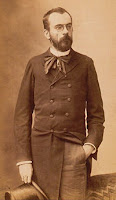 There it was, Tiefland, a DVD that should have been wonderful; a new production from the Zürich Oper, great voices.
There it was, Tiefland, a DVD that should have been wonderful; a new production from the Zürich Oper, great voices.
And it was an interesting production, when I looked at it; but it was so off-the-wall in the staging that I was of two minds: should I watch it? Or simply re-record it as audio? I thought the staging was compelling, but it had nothing to do with the story. Tiefland is a story about shepherds, people in the mountains and the valleys of Spain, with the humblest, proudest, butting up against the rich, the bored, the powerful. This production looked like a cross between Avatar and The Bride of Frankenstein. Characters in glass phonebooths emerged from the floor and elevatored up and down, changing costumes as they re-emerged; they sang from within them, and had video cameras on them, which were superimposed onto a master screen at the back, with smaller screens behind each singer. It all was so labored and so high-tech, and so 'huh?' that the whole thing was ruined for me.
Why do dramaturgs insist on making these ultra-conceptual pieces, especially for operas that people don't really know well? And how far would they take the best-known operas?
Would anyone find La Traviata
 Personally, I don't think anyone would want to see that production today, since the story is so perfectly tuned to the 'modern era' of the 1850's. But does it really become more relevant to place it in the 21st century? Would any of the social no-nos that drive the plot make any sense at all? Or would they have another layer of 'gear-switching' that the audience has to go through to enjoy it at all? Traviata does not seem to be one of those operas that get "updated" interminably, because there is too much in it that is so good in its own time.
Personally, I don't think anyone would want to see that production today, since the story is so perfectly tuned to the 'modern era' of the 1850's. But does it really become more relevant to place it in the 21st century? Would any of the social no-nos that drive the plot make any sense at all? Or would they have another layer of 'gear-switching' that the audience has to go through to enjoy it at all? Traviata does not seem to be one of those operas that get "updated" interminably, because there is too much in it that is so good in its own time.
 But what of Wagner, whose conceptualization of his Ring had so many details dear to his heart, that have all been swept into the Rhine backwater because no one really wants to produce such a mammoth concept anymore. Personally, I'd love to see a Ring cycle that was just as Wagner conceived it, including pushing the robot Fafner up over the bank and having a little trapdoor in his chest open up to reveal a megaphone through which the bass can sing.
But what of Wagner, whose conceptualization of his Ring had so many details dear to his heart, that have all been swept into the Rhine backwater because no one really wants to produce such a mammoth concept anymore. Personally, I'd love to see a Ring cycle that was just as Wagner conceived it, including pushing the robot Fafner up over the bank and having a little trapdoor in his chest open up to reveal a megaphone through which the bass can sing.
Maybe we should think of an opera company that stages one opera consistently on the set of another, with costumes as well? That way, at least it would all feel like part of the same genre. So we'd have Il Trovatore produced on the set of Madama Butterfly; Götterdämmerung unfolding, staged as Iolanthe; Wozzeck performed with the sets and costumes of Dido and Æneas dazzlingly behind it. Why not? It makes as much sense to me.




 Giulietta Simionato
Giulietta Simionato